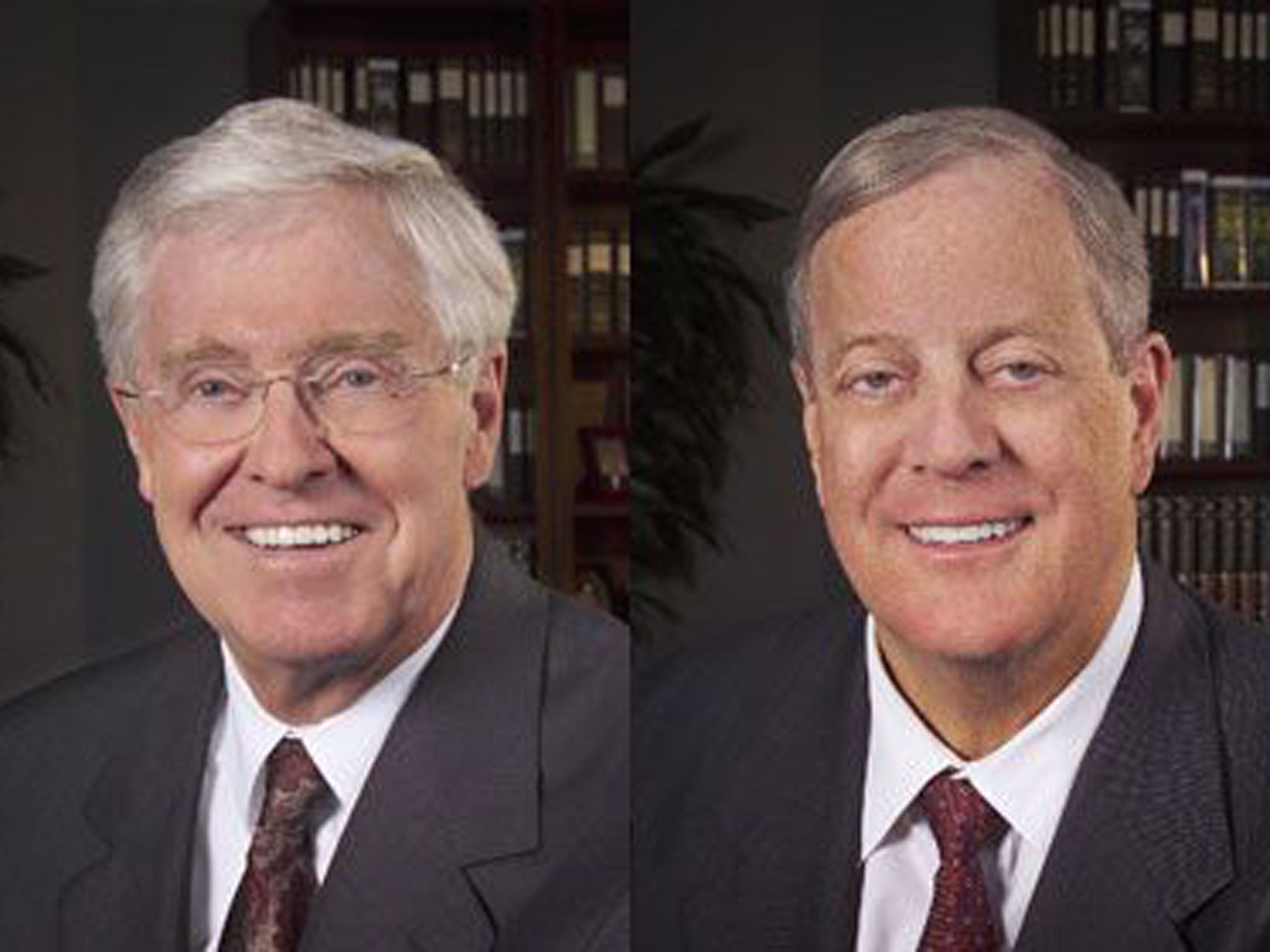Why does the Los Angeles Times fear the Koch brothers?
The Koch brothers back the Tea Party, oppose the green movement – and may soon have a new paper to promote their views

At a recent gathering of the staff of the Los Angeles Times, journalists were invited to participate in a straw poll regarding the paper’s future ownership.
How many, they were asked, would quit their jobs if Rupert Murdoch were to purchase the Times? According to a report in The Huffington Post, several people raised their hands. And what if, the poll went on, the paper went instead to the Koch brothers: right-wing owners of the controversial manufacturing conglomerate Koch Industries, and the world’s sixth- and seventh-richest men? Around half the hands in the room shot up.
The fourth-largest newspaper in the US is also the largest in the Tribune Company, which includes the Chicago Tribune and The Baltimore Sun, and which recently emerged from a four-year bankruptcy under the ownership of a bank and two hedge funds, which are now in search of a buyer. Murdoch is believed to be interested in buying the Los Angeles Times, though not the other seven titles in the group. The Times staff’s preferred proprietors, meanwhile, would be a proposed alliance of local, Democrat-leaning billionaires, who have offered to run the paper as a non-profit enterprise.
But 77-year-old Charles Koch, and his brother David, 73, with a combined personal worth of almost $70bn (£45bn), may be the only figures with the will and the wherewithal to purchase all the Tribune papers – valued collectively at around $623m. Their only prior media properties have been niche, libertarian publications. In a 30 April article, Los Angeles Times cartoonist David Horsey warned that the Kochs want to use the titles “to create print versions of Fox News”.
Before now, the brothers have advanced their agenda by backing the Tea Party; donating to Republican electoral candidates; and funding research to rebut evidence of climate change. Dr Lawrence Rosenthal, executive director of the Centre for Right-Wing Studies at the University of California, Berkeley, says their potential move into mainstream media should be viewed in the context of President Obama’s recent re-election.
“The right’s existing means of influencing national elections proved inadequate in 2012,” Rosenthal says. “The money that people like the Kochs gave to people like Karl Rove didn’t do the trick. So now they have entered a period of experimentation, and are looking at ways to repackage the Republican Party.” Several major political figures have floated ideas for the GOP’s future, says Rosenthal, “but you also have experimentation from the money people. The Kochs are thinking: ‘What we did in 2012 didn’t work; we have to do something. What if we bought newspapers?’”
The recession and the rise of the internet have caused a major shift in the US regional newspaper market, explains Ken Doctor, media analyst and author of Newsonomics. “The companies that used to buy papers were other newspaper companies,” he says. “But the traditional buyers aren’t buying any more. And because papers are so cheap now, the market is open to people who would never have thought of buying a newspaper previously.”
Some new-style buyers are welcome: in 2011 billionaire investor Warren Buffett bought his home town’s struggling Omaha World-Herald – a deal seen as uncharacteristically sentimental. But other non-traditional newspaper buyers have been less popular: also in 2011, developer and hotelier Doug Manchester acquired The San Diego U-T with the explicit intention of making it a platform for his business interests, conservative views and preferred political candidates.
The Kochs’ politics would appear to be at odds with those of The Los Angeles Times newsroom, not to mention readers in all of the broadly Democrat cities served by the Tribune titles, though Reuters media columnist Jack Shafer says the brothers’ views have been somewhat misrepresented.
“The Kochs are strongly libertarian,” Shafer explains. “They’re extremely fiscally conservative, they want a much smaller government and they’re anti-regulation. But they’re also socially liberal. They’re for gay rights. If you pushed them on drugs, I suspect they would be for, if not legalisation, then liberalisation. [California liberals] would find many areas of common ground with them. ”
Resistance to the Kochs’ mooted purchase has reached City Hall, where last week three Los Angeles City Council members signed a motion to withdraw the city’s pension funds from the firms that presently own the paper if they choose to sell to buyers who don’t support “objective journalism”. Councilman Bill Rosendahl, who introduced the motion, told the LA Times: “Frankly, what I hear about the Koch brothers, if it’s true, it’s the end of journalism.”
Profile: The Koch brothers
David Koch
David runs the chemical equipment side of Koch Industries and boasts a $34bn fortune, according to Forbes. David is the more politically active of the two brothers, and was a major funder for the 2012 Republican presidential campaign.
He is 6ft 5in, married with three children, and a basketball fan. He is also a high-profile philanthropist, having donated $15m to build the David H Koch Hall of Human Origins at the National Museum of Natural History and $100m for the David H Koch Institute for Integrative Cancer Research at MIT.
Charles Koch
Older brother Charles is also said to be worth $34bn, having built his fortune around refining and chemicals.
Described by Forbes as “a diehard libertarian”, Charles is also a notable philanthropist, co-founder of the Washington-based libertarian think-tank Cato Institute, and author of The Science of Success, published in 2007. He is married with two children.
Subscribe to Independent Premium to bookmark this article
Want to bookmark your favourite articles and stories to read or reference later? Start your Independent Premium subscription today.

Join our commenting forum
Join thought-provoking conversations, follow other Independent readers and see their replies